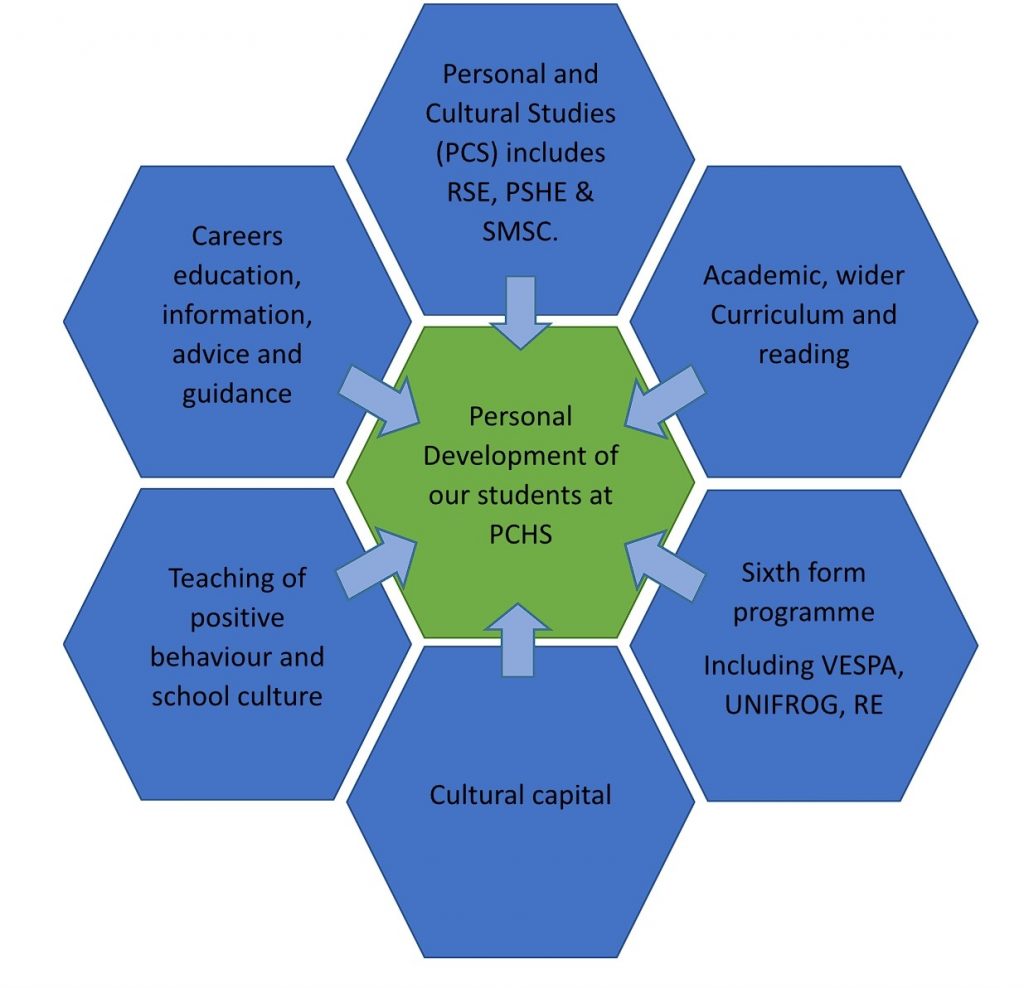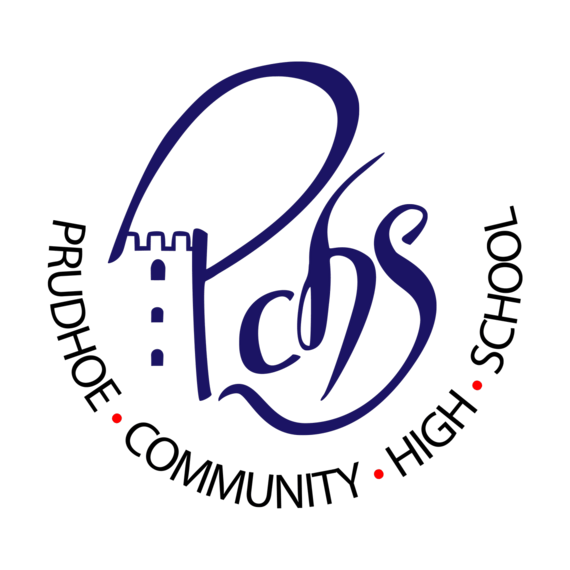
How we address the above areas.
Personal and Cultural Studies
The Personal and Cultural Studies (PCS) curriculum includes PSHE (Personal, social, health and economics), RSE (Relationships and sex education), citizenship, and SMSC (Spiritual, moral, social and cultural) content. The programme aims to fulfil our requirement as well as our moral duty to enable students to become healthy, happy and productive members of society. This will be achieved through the development of skills and attributes such as resilience, self-esteem, risk-management, teamwork and critical thinking. These will be developed alongside the students’ knowledge of their own physical and mental health and well-being, health and well-being within relationships, as well as economic, legal and political knowledge. Each year group builds on the knowledge established the year before, developing understanding at an age appropriate rate. The program covers the statutory requirements outlined by the Department for Education, including knowledge and awareness of the protected characteristics under the equality act, as well as including content requested by teachers, parents and students. The way the curriculum is crafted means that students are constantly revisiting areas of the curriculum that they may have been introduced to previously, and building on that knowledge. This leads on from the PSHE provision at middle school and into the pastoral programme at sixth form. The curriculum is split into key topics or themes, some of which recur from year to year in order to increase knowledge at a more appropriate level for each age group, but in such a way as to not be repetitive. Topics are organised to build in complexity and sensitivity throughout the year in order that students and tutors will know each other better and be more comfortable with one another by the time the most sensitive issues are addressed, for example, RSE. PCS Overview
Careers education information advice and guidance
The following information is taken from the school’s careers plan:
Prudhoe Community High School has a statutory duty for all students to secure access to independent and impartial careers guidance from year 8 up to year 13 [Education Act 2011]. Our CEIAG programme also demonstrates our compliance with the most recent DFE statutory guidance which firstly states that from January 2018, schools will use the Gatsby benchmarks to review and improve careers provision and are strongly recommended to work towards the Quality in Careers Standard. PCHS achieved the “Inspiring IAG” Gold Award in February 2017 and we were reaccredited in January 2021 for a further 3 years. Secondly, in line with statutory guidance, we have prepared a policy statement setting out how external providers of technical education and apprenticeships will be given access to students at PCHS which appears on our School Website.
There has never been a time when career guidance has been as important for young people as it is today. The landscape of education, training and employment opportunities that students need to navigate is more complex and more challenging than that faced by previous generations. The raising of the age for participating in learning means that young people face a wider range of choices of courses and places to study. Students need help to make choices and manage transitions: to do this effectively they need good quality career education, information, advice and guidance. Prudhoe Community High School’s Career Plan sets out how we provide a fit-for-purpose careers programme which will provide our students with the knowledge, inspiration and ability to take ownership of their own career action plans which will enable them to succeed in their chosen career paths.
Prudhoe Community High School is committed to working in partnership with a range of external organisations to provide a wide range of Information, Advice and Guidance (IAG) opportunities for all young people within its care. Prudhoe Community High School strives to follow best practice guidance from the careers profession and work towards achieving all eight Gatsby benchmarks. The CEIAG programme at Prudhoe Community High School will follow the Association for Careers Education and Guidance (ACEG) Framework to ensure the quality and breadth of careers and work-related education for young people. Any external provision in which Prudhoe Community High School engages will need to demonstrate compliance with the Matrix Standard, listed with the National Careers Service and/or the Careers Professional Alliance.
Prudhoe Community High School is also committed to liaising with Northumberland County Council (NCC) and other relevant organisations to ensure Pupil Premium (PP), SEND and other vulnerable groups of students gain access to IAG regarding mainstream education, employment and training and also the full range of specialist provision and additional support that is available for them to access that provision.
On top of our careers programme, we offer FutureMe. This is a targeted programme of activities being offered to our students by NECOP. Students taking part in FutureMe work with partner Universities in the region to have access to a range of activities and events to support them in considering their future options and learning about educational pathways available to them. This includes;
- Have the opportunity to plan for their future and gain an understanding of what can support them in reaching their goals.
- Have access to high-quality information and support to help them consider whether higher education is the right option for them.
- Have an increased awareness and understanding of higher education opportunities and progression pathways in the NorthEast region.
To read the school’s full careers plan please see here.
Academic and Wider curriculum
Departments within the school contribute to the personal development of our students through a range of activities that go above and beyond the curriculum. These include extracurricular activities such as STEM clubs, Mission discovery working with astronauts, NUFC foundation, sports teams, debate club as well as many others. The school also offers a number of trips and visits both within the UK and abroad such as theatre visits, competitions, Iceland trip (Geography), and Italy trip (music and school choir). The school also actively promotes student’s participation in National initiatives such as the National Citizenship Service and the Duke of Edinburgh award scheme.
Reading Curriculum
Students can’t access an ambitious curriculum if they can’t read. Our ambition is to ensure that our students can read fluently, unpick and read texts comprehensively. This is crucial in unlocking potential and ensuring all students can access the curriculum and achieve success. The EEF document Improving Literacy in Secondary Schools underpins the school focus on reading and literacy across the curriculum for students in years 9 – 11 with a further focus on academic reading in the Sixth Form.
We recognise that reading development/improvement extends beyond the English department and all subject areas have a responsibility to develop reading and literacy. Literacy and specifically reading is key to learning across all subjects in secondary school and a strong predictor of outcomes in later life. Disciplinary literacy makes clear that every teacher communicates their subject through academic language, and that reading, writing, speaking and listening are at the heart of knowing and doing Science, Art, History, and every other subject in secondary school.
Teaching of positive behaviour and school culture
As a school, we recognise the importance of promoting, encouraging and teaching positive behaviours. Understanding how to behave well can be taught and this is supported as good behaviour is modelled by adults in their interactions with students. Our school adopts procedures and practices
that promote good behaviour and helps students learn how to behave appropriately. We recognise that children learn respect by receiving it. We expect our staff to act professionally at all times and speak respectfully to students. We expect our staff to make effective use of praise and encouragement for good effort, achievement and behaviour. This is supported through our tutorial programme which incorporates our school’s learning behaviours and Personal Cultural Studies (PCS). Through these sessions and students’ academic curriculum we promote fundamental British values that enable students to develop their self-knowledge, self-esteem and self-confidence. They also enable students to distinguish right from wrong and to respect the civil and criminal law of England. We encourage students to accept responsibility for their behaviour, show initiative and understand how they can contribute positively to the lives of those living and working in the locality of the school and to society more widely. The promotion of tolerance and harmony between different cultural traditions enables students to acquire an appreciation of and respect for their own culture and other cultures as well as encourages respect for other people.
Cultural capital
At PCHS, we recognise that for students to aspire and be successful academically and in the wider areas of their lives, they need to be given rich and sustained opportunities to develop their cultural capital.
The school recognises that there are six key areas of development that are interrelated and cumulatively contribute to the sum of a student’s cultural capital:
- Personal Development
- Social Development, including political and current affairs awareness
- Physical Development
- Spiritual Development
- Moral Development
- Cultural development
Sixth Form Programme/VESPA/RE at sixth form
In the 6th form at PCHS, we deliver a tutorial programme which is ambitious in its aim to develop students’ character, confidence and independence to ensure that they are physically and mentally healthy. We use the programme to prepare them for life beyond the 6th form through career advice and expert guidance for those applying to universities and apprenticeships but we are also committed to preparing our students for the world of work. We explore these opportunities by organising several visits for our 6th-form students across the two years of study. Our 6th formers are given regular opportunities to meet representatives from a range of different organisations during the tutorial time to help them with their choices including talks for those with aspirations for Oxbridge applications. Our tutorial sessions also provide our 6th form students with the opportunity to develop the skills needed to develop their personal finances, study fundamental British values, consider a wide range of religious, philosophical, psychological, sociological and ethical issues and develop their own codes of belief whilst developing an understanding and appreciation of diversity. The VESPA programme which is also delivered through our tutorial time is aimed at helping our students to develop the right mindset to enable them to be successful Post 16 students. Departments stretch and challenge our sixth form students by providing opportunities to work beyond the specifications with academic professionals for example; Brain Day for Psychologists, DNA technology for Biologists etc. Our sixth form students are also encouraged to become peer mentors, send mentors and mental health and wellbeing mentors as a way of supporting students lower down the school.

